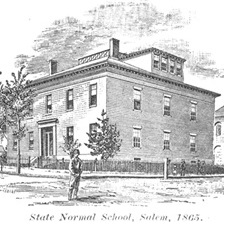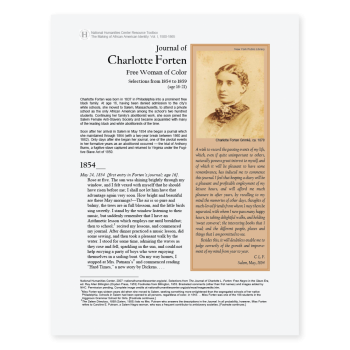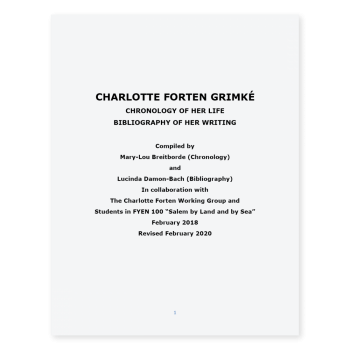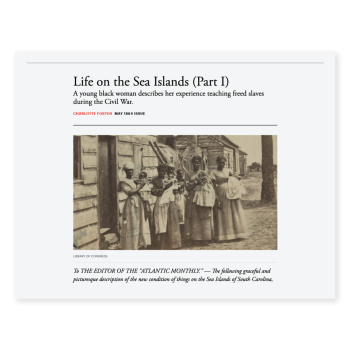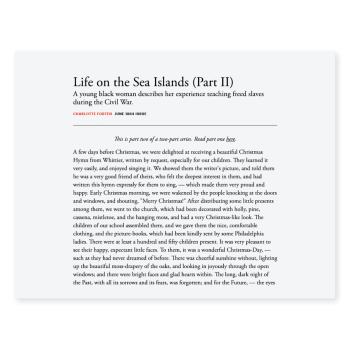Charlotte Forten Memorial Project
Who is Charlotte Forten?
Charlotte Louise Bridges Forten Grimke (1837-1914) was an abolitionist, poet, and educator who is celebrated as the first African American woman to graduate from Salem State University, then known as The Normal School, and to teach in Salem Public Schools.
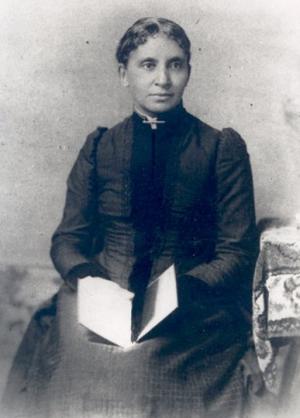
Selected Biography
Dig Deeper
- Diary
- Chronology
- Forten’s work in The Atlantic
- Legacy Room at Salem State
- CBS feature Black History Month
Selected Biography
Forten was born in Philadelphia, PA in 1837 to Robert and Virginia (Woods) Forten. Her grandfather, James Forten, father, and uncles were all prominent abolitionists. After Charlotte’s mother died when she was three years old, she was raised and tutored by her grandmothers, aunts, and close family friend Amy Matilda Cassey. By the 1850s, unlike Philadelphia, Salem’s vibrant free Black community successfully sued to integrate its schools. At the same time, Charles Lenox Remond, Salem’s noted abolitionist, married widow Amy Matilda Cassey of Philadelphia. In 1853, Robert Forten sent his daughter Charlotte to live with the Remonds and finish her formal education in Salem’s integrated schools. She began a lifelong habit of keeping diaries in May 1854, during her time at the Remonds.
Charlotte graduated from Higginson Grammar School for Girls and joined the vibrant Black abolitionist community centered in Boston and Salem. In addition to her studies, she documented walks by the ocean, outings in Marblehead and Nahant, and skating parties in her diaries. As a young activist, she made trips to Boston to attend lectures, visit anti-slavery fairs, and protest against the capture and return of escaped slaves, and in 1855, she joined the Salem Female Anti-Slavery Society. Charlotte was also a gifted poet, and her diaries include visits with her lifelong mentor, poet John Greenleaf Whittier. As both a poet and activist, her work and commentary were published in Salem papers as well as The Liberator, the Boston-based abolitionist journal published by William Lloyd Garrison.
After graduating from Higginson, Charlotte enrolled in Salem Normal School, now Salem State University. In her diaries, Charlotte described her school days in Salem as:
“the happiest of my life….I have been fortunate enough to receive the instruction of the best and kindest teachers; and the few friends I have made are warm and true—New England.”
In 1856, Charlotte became the first Black graduate of Salem Normal School (Salem State University). Her first teaching position was at Eppes Grammar School in Salem in 1856, becoming the first Black person hired to teach white students in a Salem public school. After a brief return to Philadelphia in 1858, Charlotte again lived in Salem from 1859 to 1862 when she enrolled in additional classes at the Salem Normal School and taught at Higginson, her alma mater. Her diaries from these years recount walking her beloved beaches and participating in the Crispus Attucks commemoration in Boston.
At the outbreak of the Civil War, with the encouragement of Whittier, her mentor, Charlotte volunteered to teach formerly enslaved children at the Penn School in Sea Island, Georgia. She was nearby during the Battle of Fort Sumter in 1863 and volunteered at a South Carolina hospital after the defeat of the Massachusetts 54th regiment.
After the war, Charlotte returned to Massachusetts and worked for the Freedman’s Bureau, where she met Francis James Grimké, a free man of color who had been wrongly enslaved. She then returned south to teach in South Carolina and Washington, DC, and in 1878 married Grimké, by then a prominent Presbyterian minister leading a major church in Washington. Charlotte continued to teach and to write poetry and essays throughout her life. She also maintained her commitment to issues of social justice, becoming actively involved with the National Association of Colored Women and the cause of women’s suffrage. Charlotte's diaries have been published in numerous editions and continue to serve as a unique record of the lived experience of a northern Black woman during the Civil War era.
*Excerpts via Charlotte Forten Legacy Room at Salem State and Salem.org
Read excerpts from Charlotte’s diaries: Chronology of Charlotte’s life:
Charlotte’s published work in The Atlantic:
Charlotte Forten Legacy Room at Salem State University
Meier Hall, Salem, MA Suite 316B
